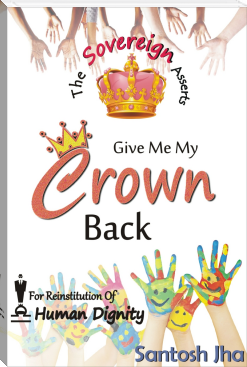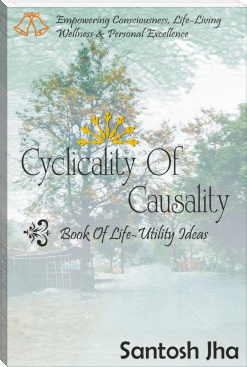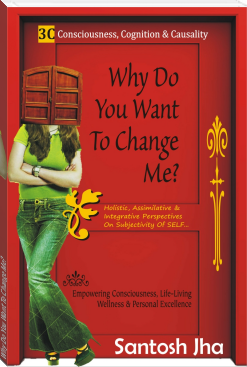Give Me My Crown Back, Santosh Jha [best romance ebooks .txt] 📗

- Author: Santosh Jha
Book online «Give Me My Crown Back, Santosh Jha [best romance ebooks .txt] 📗». Author Santosh Jha
Throughout the history of humanity, the immense problem of integration and linking of collective knowledge crippled and restricted the sharing of knowledge to majority of people. This still remains a dream attainment for humanity. This lack of sharing of collective knowledge creates integration trouble for larger human population itself, who thus remain fragmented and ideologically competing and conflicting. It is tragic and calamitous for humanity that even in contemporary world, there is no single timeline that runs through all 7 billion plus people on the Earth. Most people still live in mid-ages in their ideological and perceptional world of Reality. Big chunk of global human population is living in before Christ era. Even among educated urban population, majority of people are in a timeline, centuries and decades back. They may be living with all 21st century technologies, gadgets and lifestyle choices but their mental, perceptional and ideological timeline is still 19th century or 20th century.
This happens because of failure of humanity to integrate knowledge, upgrade it and share it with all layers of humanity. This is also a huge challenge for larger humanity to understand and accept that Time is not about dates and year on a calendar. It is rather everything about being ‘at’ or ‘behind’ of Holism of Reality, depending upon how much ‘part’ of Reality one associates his or her consciousness with. It may be said that it is also a big blame on scientific community as they even could not reach out the scientific idea of Time, to squeeze the philosophies and faith-related populism out of its understanding among common masses. Universality of acceptance of singular Holism of Reality however has the best prospect in 21st century and this is the singular agenda for all 7 billion plus people.
There is another aspect of this trouble of lack of integration and equal sharing of collective human knowledge, which has been very clearly documented in history. The very partial, fractional and fractured nature of collective knowledge of humans, not having means or intent to integrate them and share them, instinctively engendered a strong sense of missionary mindset. History is full of details of the missionary missions and resultant suppression of masses, resulting in annihilation of their dignity. History is a well documented record of how religion and politics, emboldened and spearheaded by missionary zeal, happened to be the biggest causalities of violence, repression and annihilation, as never ever there could be singular Holism of Reality about religion and politics. Despite the fact that all religions and political ideologies on Earth, since ages have common core creed and they are universal for every human being, still, the lack of integration and assimilation of different wisdoms created differing perceptions and perspectives. Naturally, missionary sentimentalities were pronounced and this fueled confusion, conflict and chaos.
This continues even today in age of reason of 21st century, though in subtle form. The growing trouble is that even today, there are countries and ruling classes there, who are using the force of their might and that of state power-authority to forcibly integrate all population of different ethnic, religious, cultural and ideological belief systems into unitary and monolithic collective belief system. Such forcible integration, which is worst form of missionary aggression, is definitive signs of how humanity has failed big time in intellectually integrating their collective wisdom and sharing it equally with all. Knowledge is singular because ‘Reality’ is singular and when shared and assimilated well, it automatically integrates the consciousnesses of people. Any use of force is signature of partial, fractional and fractured wisdom.
The Integration and Assimilation of collective human knowledge about Reality and sub-Realities of life-living has to happen, then only the seven billion plus humanity can stand tall and united under one single ‘Identity’ of Humanity. Reality is singular and its expression is the root cause of trouble. This very singular objective realism of Reality is the common basis of all humans. This alone is the only ‘Identity’ of all humans. The contemporary world is in immense and perpetual conflicts and chaos only because 7.5 billion-strong humanity has not yet been integrated and assimilated into single Reality. As this could never happen in past and therefore, humanity had to face untold miseries. Now, in 21st century, we know that state and politics is not the solution of humanity. The violence of any shade itself is against and antithetical to the very Reality of Reality. Under no mandate and under no legitimacy, violence can be allowed. The contemporary state and politics with its mandate and legitimacy rooted in abstract and mystical ideas, has no justification in 21st century Reality. The only need is integration and assimilation of humanity under one ‘Identity’ through singular Reality. This is the task and humanity now has the required wherewithal to execute to perfection.
As we said earlier, the history of evolution of the idea of state and polity is testimony to the fact that even when loads of philosophies attempted to link and underline the ultimate sovereignty of people and even attempted to condition the role of state and polity towards liberty of people, they failed to achieve the desired end just because they faced this twin problem. First, they could not find the scientific basis of Reality and therefore they failed to integrate and assimilate humanity into one single idea about Reality. Secondly, humanity did not then have this wherewithal to effect and actualize mandate through a pragmatically feasible way.
There are two classic examples in history of humanity, which show how partial, fractional and fractured knowledge about Reality could never achieve the universal goal of human integration and failed to establish the uniformity of Human Dignity across all layers of humanity. These examples also exhibit how lack of integration and linking of collective wisdom of humanity failed the very utility and fruition of knowledge. These two examples are the idea and grassroots pragmatism of Humanism and Jurisprudence. They need to be understood to have a clear understanding of how and why history failed but in 21st century we have this well-potentialed prospect of being successful.
The Renaissance age idea of Humanism was surely a big leap forward for humanity. It powerfully advocated the hugely crucial and critical reality that human world and human issues must be approached and dealt with from the perspective of the Realism of human body and mind and not from some external, abstractive and faith-related notion. In its holism, Humanism in 15-16th century attempted to install a scientific perspective of objective, measurable and verifiable fact-based Realism of humanity and human life-living. This at that time stood in reaction and clash with contemporary wisdom, which was dominated by Monarchs and Churches and their abstract and faith-based Realism. Humanism had a perfect call for a reason and logic based world of humans where Human Dignity had the best possible potential of fruition. This however, could not happen and Humanism movement lost its energy very soon.
If we relook the history and analyze the factors that failed humanism in installing a world order that it deserved, we can clearly point out key reasons. First and foremost, Humanism movement of renaissance era was more philosophically aligned than scientifically factual about Reality; especially about that of human body and mind. It sort of hypothesized a reality about human beings, which was not scientifically tenable. The core idea of Humanism accepted the General Will of individual as rational and righteous, which was untenable and also, it did not account for so many other elements that conditions the Human Will, especially the education and knowledge part. To say that an individual knows what is good for him and therefore he has the Will to be the Boss is as scientifically untenable as saying that the King is the representative of God and has the right to rule over people. Humanism failed as collective wisdom then did not have the true scientifically tenable knowledge of Reality and that of Human Consciousness and its complex nature. Even this much hyped liberal philosophy of social contract hypothesized about a human Reality, which was unscientific and did not match with the Reality of human consciousness.
Humanism as a creed rested on the hypothesis of innate human nature, which was philosophical but as scientific knowledge about human body, brain, consciousness and cognitive behavior, etc were still not available, it stood in contradiction to what actual innate human nature is. The cardinal mistake of Humanism was that as it accepted the primacy and supremacy of individual over all other things, it naturally had to fall on a hypothesis about the innate righteousness and infallibility of average human being. This hypothesis, we now know very well, is out-rightly wrong. Humanism has to be the sole basis of every human affair not because humans are innately right and good. Rather, on the contrary, human beings are innately reactive, their consciousness is very localized and given to stupidities and hypocrisies. Still, humanism has to be the no-option, only choice because, humans cannot be managed and administered on any basis and system, which does not objectively and singularly conform to the holistic Reality of human body-mind mechanism and processes. Humanism in 21st century has to be based on the scientific Reality of Humanity and not on some utopian philosophical hypotheses.
Secondly, idea of 15th-16th century Humanism failed to integrate itself with other contemporary knowledge of humanity. The very assertion of the hypothesis about the centrality of individual Will required it to be aligned with the imminence of education and awareness of collective humanity about the newly emerging knowledge of the world around them. The limited elitist nature of ‘humanism-appeal’ was evident and rooted in lack of tools of effective communication structures then. Naturally, Humanism remained restricted to just a philosophy of an idealism, for which there was little pragmatic grassroots realities backing it. Any change, if it has to sustain, has to ride on an energy that derives its source not from the patronage of a section of society but from the support of the majority of masses itself. Renaissance primarily was patronized by the elite section and as communication and sharing was not easy then in the 15-16th century, it failed to reach the mass base and therefore died down as regional political realities changed, weakening the force of the patronage it had.
The same reasons can also be attributed to the idea of modern Jurisprudence not becoming a single, objective and universal reality, which is probably the most critical requirement for Human Dignity. If we look at the history of humanity, if we pick up one single element of human societies that has caused most pains, sufferings and heinous injustice, it is the abstractions, stupidities and hypocrisies of the idea of Jurisprudence. Its innate and embedded propensity to align with politics and power structures makes Jurisprudence a deep pathology of many human troubles, especially the killer of human dignity. It still remains in the same archaic mold.
The worst hypocrisy of history of evolution of jurisprudence however remains the structural part of justice delivery system, which actually enacts the laws and reaches out for individuals. The ghastly fact remains that no doubt, human dignity has been butchered hugely by bad laws but majorly by corrupted and inefficient law enforcing and dispensing agencies and structures. The judicial and civil administrations almost always ensured that benefits of lawfulness of system remained at the side of the mighty and authoritative; leaving out the poor and un-resourced. This malaise jurisprudence seldom considers as something as part of the holism of its duty even today. Globally, even in developed countries, where human dignity has better history, the contemporary judicial system still has the innate propensity and orientation to align with state and its agencies, while sitting on judgments concerning human rights and dignity; leaving the common men and women gasping for the much sought after relief and justice.
The trouble with jurisprudence is the





Comments (0)